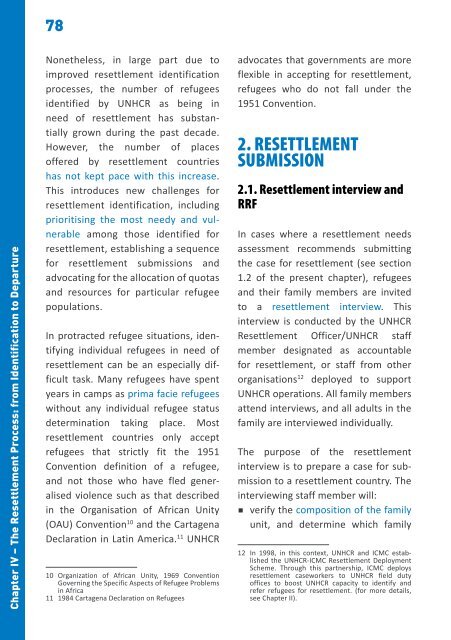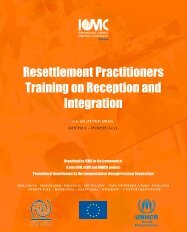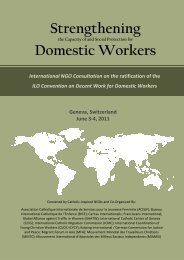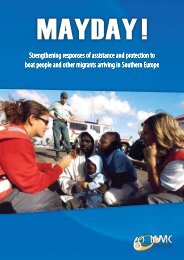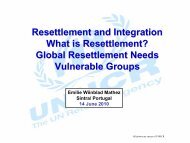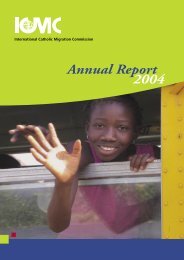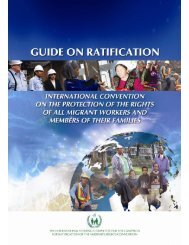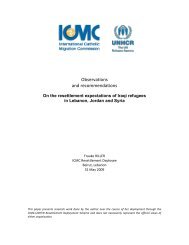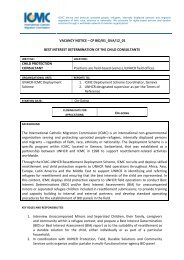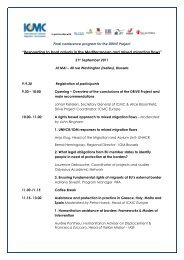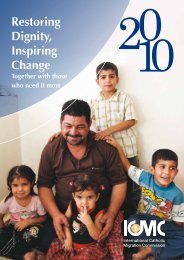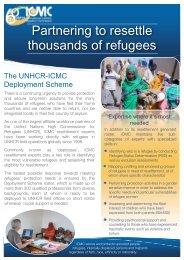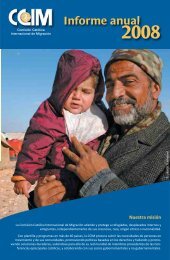ICMCEUROPE WelcometoEurope.pdf (5.89 MB)
ICMCEUROPE WelcometoEurope.pdf (5.89 MB)
ICMCEUROPE WelcometoEurope.pdf (5.89 MB)
You also want an ePaper? Increase the reach of your titles
YUMPU automatically turns print PDFs into web optimized ePapers that Google loves.
78<br />
Chapter IV – The Resettlement Process: from Identification to Departure<br />
Nonetheless, in large part due to<br />
improved resettlement identification<br />
processes, the number of refugees<br />
identified by UNHCR as being in<br />
need of resettlement has substantially<br />
grown during the past decade.<br />
However, the number of places<br />
offered by resettlement countries<br />
has not kept pace with this increase.<br />
This introduces new challenges for<br />
resettlement identification, including<br />
prioritising the most needy and vulnerable<br />
among those identified for<br />
resettlement, establishing a sequence<br />
for resettlement submissions and<br />
advocating for the allocation of quotas<br />
and resources for particular refugee<br />
populations.<br />
In protracted refugee situations, identifying<br />
individual refugees in need of<br />
resettlement can be an especially difficult<br />
task. Many refugees have spent<br />
years in camps as prima facie refugees<br />
without any individual refugee status<br />
determination taking place. Most<br />
resettlement countries only accept<br />
refugees that strictly fit the 1951<br />
Convention definition of a refugee,<br />
and not those who have fled generalised<br />
violence such as that described<br />
in the Organisation of African Unity<br />
(OAU) Convention 10 and the Cartagena<br />
Declaration in Latin America. 11 UNHCR<br />
10 Organization of African Unity, 1969 Convention<br />
Governing the Specific Aspects of Refugee Problems<br />
in Africa<br />
11 1984 Cartagena Declaration on Refugees<br />
advocates that governments are more<br />
flexible in accepting for resettlement,<br />
refugees who do not fall under the<br />
1951 Convention.<br />
2. RESETTLEMENT<br />
SUBMISSION<br />
2.1. Resettlement interview and<br />
RRF<br />
In cases where a resettlement needs<br />
assessment recommends submitting<br />
the case for resettlement (see section<br />
1.2 of the present chapter), refugees<br />
and their family members are invited<br />
to a resettlement interview. This<br />
interview is conducted by the UNHCR<br />
Resettlement Officer/UNHCR staff<br />
member designated as accountable<br />
for resettlement, or staff from other<br />
organisations 12 deployed to support<br />
UNHCR operations. All family members<br />
attend interviews, and all adults in the<br />
family are interviewed individually.<br />
The purpose of the resettlement<br />
interview is to prepare a case for submission<br />
to a resettlement country. The<br />
interviewing staff member will:<br />
• verify the composition of the family<br />
unit, and determine which family<br />
12 In 1998, in this context, UNHCR and ICMC established<br />
the UNHCR-ICMC Resettlement Deployment<br />
Scheme. Through this partnership, ICMC deploys<br />
resettlement caseworkers to UNHCR field duty<br />
offices to boost UNHCR capacity to identify and<br />
refer refugees for resettlement. (for more details,<br />
see Chapter II).


